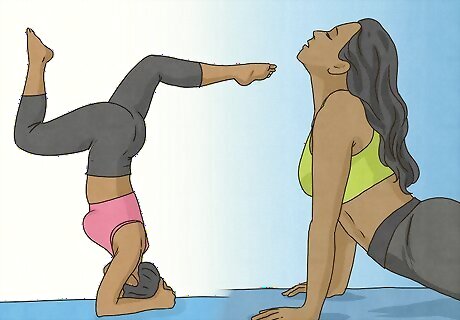
views
- Yoga is unlikely to be a sin, but it depends on how much weight you give to the fact that its historical roots are based in the Hindu religion.
- Yoga isn’t a religion, but it did start out as a religious practice. However, today’s version of yoga doesn’t resemble the religious version.
- The Bible doesn’t mention yoga, but it does suggest that physical fitness and meditation are fine so long as they’re in service of the Lord.
Is doing yoga sinful?

Probably not, but it depends on your views and the type of yoga. The Bible doesn’t offer any explicit guidance on whether yoga goes against God or not, so the best we can do is make educated guesses based on the evidence. While yoga does come from a non-Christian background, the relevance of that background is sort of up to you and what you believe God wants. Still, if you think yoga is just a form of exercise, it’s hard to see how it’d be sinful. A good way to think about this is to compare yoga to gift-giving on Christmas. The origin of that practice goes back to pagan gift-giving during winter rituals. Does that matter today? If you aren’t giving the gifts to celebrate a pagan deity, the answer is probably no. The same logic could apply to yoga.
Is yoga a religion?

No, but it does have historical roots in Hinduism. Yoga is mentioned in the Vedas, the Hindu religious texts that are basically Hindu’s version of the Bible. While yoga was originally taught as a combination of physical, mental, and spiritual practices, what we know as yoga today is quite different. Still, it’s impossible to deny that Hinduism and yoga aren’t connected. There are still some Hindu, Buddhist, and Jainists out there who practice yoga with a guru/yogi to engage in prayer or religious rituals. That’s a far cry from what happens at most gyms and yoga studios these days, though.

Without the spiritual component, yoga is simply a type of exercise. If you aren’t using yoga to pray or engage in worship, all you’re doing is working out. It’s just poses, stretches, and calisthenics, so it doesn’t qualify as a religion. Again, this is only in reference to the yoga you’d do if you go to a gym or yoga studio, not the yoga Hindus might do as part of a morning meditation. If you’re in a class or doing a video tutorial and you’re asked to visualize something, repeat a mantra, or open yourself up to an energy, that’s a red flag that what you're doing goes beyond just fitness.
What does the Bible say about meditation and yoga?

If you think yoga is intrinsically religious, it’s a no go (Exodus 20:3). “Thou shalt have no other gods before me.” This is a bit of a radical way of thinking about things, but if you do genuinely believe yoga today has a meaningful connection to Hinduism, yoga would qualify as an idolatrous act. Again, it’s not super easy to come to this conclusion for most Christians. Still, if it feels that way in your heart, don’t do yoga.

Exercise is fine, but it can’t replace God (1 Timothy 4:8). “For bodily exercise profiteth little: but godliness is profitable unto all things, having promise of the life that now is, and of that which is to come.” In other words, don’t look to physical fitness as a substitution for the Word of God. Note, however, that the passage doesn’t say exercise is counterproductive—just that godliness is essential! One way to think about this is that if you do yoga while reciting a Christian prayer, in an effort to keep your body pure for the Lord, or simply as a way to get in the right headspace before church, you are engaging in godliness.

Meditation is fine if it’s in service of a righteous life (Psalm 1:2). “But whose delight is in the law of the Lord, and who meditates on his law day and night.” The Bible seems perfectly fine with meditation so long as that meditation surrounds God’s laws. If you want to meditate as a Christian, you’re in the clear here so long as you’re meditating on God. Just as a note, yoga and meditation don’t really have anything to do with one another, outside of the fact that both practices are popular with Hindus.

Don’t get carried away by new age spiritualism (Hebrews 13:8-9). “Jesus Christ is the same yesterday and today and forever. Do not be carried away by all kinds of strange teachings.” This one is pretty straightforward. If you’re going to do yoga, don’t let someone convince you that it’s worth exploring crystals, polytheism, or some other new age spiritual trend.
Can Catholics do yoga?

Look towards Pope Francis’s words on yoga for your answer. “You can follow thousands of catechism courses, thousands of spirituality courses, thousands of yoga or Zen courses and all these things. But none of this will be able to give you the freedom as a child (of God).” Pope Francis said this in a homily that aired on Vatican radio. His point was that no matter how many semi-religious things you do or pursue, none of them will get you where worshipping the Lord will. Based on this homily, it seems like Pope Francis leaves the door open for Catholics to perform yoga, so long as they don’t use it as a substitution for actual worship. The comparison he makes to catechism is interesting. Catechism is a decidedly Catholic practice, and putting yoga on the same level seems to imply that it’s okay if you remain a devout Catholic.
Conclusion

It’s difficult to see how yoga on its own would be a sin. If you take the hardline position that anything even remotely related to a non-Christian tradition is sinful, then yoga would fit the bill. However, if you’re just doing yoga to exercise, it seems that both the Bible and religious leaders think it’s acceptable. It all boils down to whether you’re worshiping another God while doing it or not. Remember, if you follow a guide or take a class and people start asking you to open yourself to energies, chant a mantra, or visualize something, it’s time to stop just to be safe. Trust your instinct here. If you think God wouldn’t be happy with you doing yoga, don’t do it. If it doesn’t feel like there’s anything wrong with yoga, go for it!




















Comments
0 comment